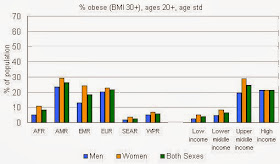 |
| No it hasn't |
Obesity and overweight are very different. Overweight refers to a Body Mass Index (BMI) over 25 whereas obesity refers to a BMI over 30. Obesity, especially severe obesity, is associated with a range of negative health outcomes, whereas being overweight is not associated with higher mortality. Indeed, being overweight is associated with slightly lower mortality, as a meta-analysis of 97 studies showed last year.
Being overweight is also much more common than being obese. Of the 35 per cent of adults who are overweight in the world, only 12 per cent are obese and most of them are in the developed world. This is rather different to the claim made in the Guardian that there are "almost twice as many obese people in poor countries than in rich ones".
According to the WHO, there are half a billion obese people in the world. This, again, is rather different to the claim that there are one billion obese people in the developing world. The graph below shows rates of obesity, which remain well below ten per cent in the developing countries. The WHO notes that these rates have "nearly doubled" since 1980, but this is clearly from a very low base and it is a far cry from rates "quadrupling", as reported in headlines today.
You could say that this is just another case of shoddy journalism or, more specifically, shoddy headline writing, but the ODI report actively encourages journalists to assume that overweight and obesity are more or less the same thing. Almost incredibly, at no point in their 133 page document do the authors give figures for obesity separately. In contrast to the WHO, who make the distinction clear, they lump overweight and obesity together throughout. I assume they do this because they want to exaggerate the scale of the problem and come up with a BIG NUMBER, in this instance ONE BILLION.
Skimming through the report, I see that the authors have a particular bee in their bonnet about people eating meat and get aroused by the idea of food rationing. They do, however, accept that lifestyle regulation of diet is unpopular...
There is little appetite amongst the public and their leaders in high-income countries to take strong measures to influence future diets. Most people hate to see regulation of their access to favoured foods, see taxation of unhealthy foods and ingredients as onerous and unfair, and acquiesce only in response to public information and education.
But that's not going to stop them...
This is not to conclude that diet policy must be hesitant and timid, even if that is, apparently, the public mood. When taking action to limit tobacco smoking, governments often led the way, given the strong evidence from medical studies showing the harm caused by smoking. Although diet is a more diverse issue than smoking, there may be scope for governments to take more incremental measures, perhaps in combination that may pave the way for public acceptance that something needs to be done, if future health costs are to be contained.
Exaggerating the scale of the problem as well as exaggerating the costs (which may be non-existent) is one way of "paving the way for public acceptance".
...It seems, then, that it is only a matter of time before a turning point arrives at which there is more appetite for stronger and effective measures to influence diets.
Maybe so. As I said yesterday, a lack of public support for lifestyle regulation has never stopped them trying.



Watching the news from South Sudan yesterday evening the only fat bugger was the BBC journo. The locals were pretty slim. Kepp an eye out on news reports from developing countries. Lard arses are hard to spot.
ReplyDeleteI switched on the 'Today' programme this morning. The first words I heard were 'salt' and 'sugar'. I switched off.
ReplyDeleteAs a member of an overlooked and marginalised minority, the clinically underweight, where's my pressure group demanding free fattening food or my fake charity lobbying government for subsidised biscuits for the scrawny? That at least would make some sense, since there are, I am told by my doctors, actual negative health consequences associated with a LOW BMI. Just sayin'.
ReplyDeleteThis comment has been removed by the author.
ReplyDelete